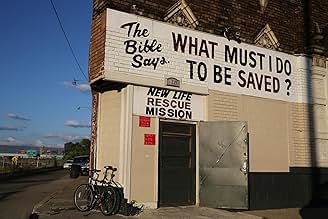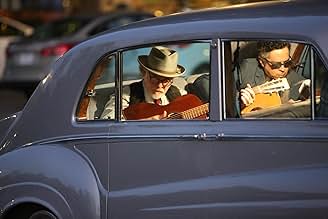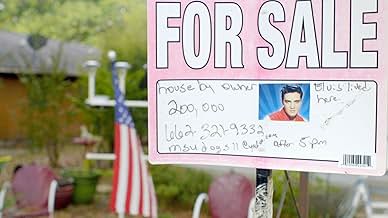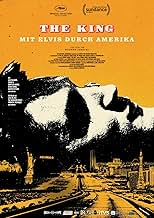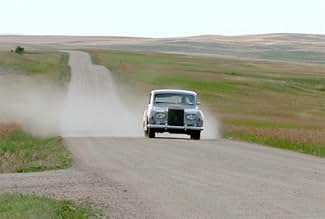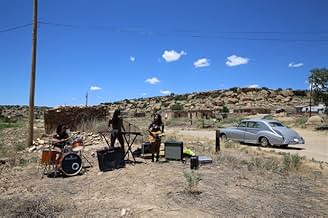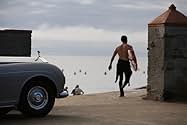IMDb RATING
6.9/10
1.3K
YOUR RATING
Forty years after the death of Elvis Presley, a musical road trip across America in his 1963 Rolls Royce explores how a country boy lost his authenticity and became a king while his country ... Read allForty years after the death of Elvis Presley, a musical road trip across America in his 1963 Rolls Royce explores how a country boy lost his authenticity and became a king while his country lost her democracy and became an empire.Forty years after the death of Elvis Presley, a musical road trip across America in his 1963 Rolls Royce explores how a country boy lost his authenticity and became a king while his country lost her democracy and became an empire.
- Director
- Writers
- Stars
- Awards
- 1 win & 10 nominations total
Elvis Presley
- Self
- (archive footage)
Mike Tyson
- Self
- (archive footage)
EmiSunshine
- Self
- (as Emi Sunshine & The Rain)
Franklin D. Roosevelt
- Self
- (archive footage)
Leo Bud Welch
- Self
- (as Leo "Bud" Welch)
Martin Luther King
- Self
- (archive footage)
- Director
- Writers
- All cast & crew
- Production, box office & more at IMDbPro
Featured reviews
The King is essentially three or four really good documentaries edited into one and that's where the trouble starts. Elvis' life and career are fascinating to watch. And the lies on which the American dream is built - stolen land, slavery, apartheid, the corrupted political system - deserve every effort to refocus public awareness. The roadtrip in Elvis' old Rolls Royce is a nice idea. Just that trying to link his rise and fall to all that happens in America over the past 70 years seems forced and doesn't give each story the necessary time and attention. Viewing The King I felt like watching an interesting docu on TV while someone else got hold of the remote and constantly switches to another channel. 8 Stars for the original idea, 2 Stars for execution.
Still ruminating on this one. The film tries to compare the career of Elvis Presley to the rise and fall of the American dream. While taking a road trip in one of Elvis' Rolls Royce's (not a trademark Cadillac) and interviewing celebs, people who knew him, and people who didn't but live near where he did. Ambitious. Thought provoking. Originally called Promised Land then changed to The King. Just like the change of the title, the allegory doesn't quite work.
This is a documentary film that was supposed to be about the America that Elvis helped mold with his brand of rock and roll music, swinging hips, and movie stardom. Oh, and let us not forget how saturated his face and image were marketed on from everything from toys to toasters in the 1950's through 1970's and beyond where he is still considered the King of Rock N Roll.
But really what this documentary unfolds and addresses before our very eyes is the director/writer. Eugene Jarecki's left leaning political view that Elvis Presley and by extension Donald Trump destroyed the American dream and made themselves very wealthy on the backs of hard working Americans that did not look like themselves.
I found the documentary an unfair view of a time in America when Americans were actually prosperous both as a country and as hard working immigrants who made it in America and regardless of their race, religion, or ethnicity either simply enjoyed Elvis Presley and/or wanted to see more and more of Elvis on the stage and in the movies.
Any public image of a politician/musician/film star/author/celebrity can always be criticized for not supporting some group or some cause but why do some writers/directors use this platform of film to disparage others who do not share their own view of the world?
I give the film a 4 out of 10 IMDb rating and I really hope that the Amazon censors will allow my review to remain without pulling it as they may not share my own view which is there have always been two sides to every coin and every controversy.
But really what this documentary unfolds and addresses before our very eyes is the director/writer. Eugene Jarecki's left leaning political view that Elvis Presley and by extension Donald Trump destroyed the American dream and made themselves very wealthy on the backs of hard working Americans that did not look like themselves.
I found the documentary an unfair view of a time in America when Americans were actually prosperous both as a country and as hard working immigrants who made it in America and regardless of their race, religion, or ethnicity either simply enjoyed Elvis Presley and/or wanted to see more and more of Elvis on the stage and in the movies.
Any public image of a politician/musician/film star/author/celebrity can always be criticized for not supporting some group or some cause but why do some writers/directors use this platform of film to disparage others who do not share their own view of the world?
I give the film a 4 out of 10 IMDb rating and I really hope that the Amazon censors will allow my review to remain without pulling it as they may not share my own view which is there have always been two sides to every coin and every controversy.
I managed to find this documentary on DVD at my public library. I remember Elvis, he was only 10 years older than me. I remember when he died but really didn't have a concept of how young 42 is. Now that my own youngest son is 42 it hits me.
The documentary is good if you view it as a collection of different people expounding on what they thought his influence was rather than take everything as gospel, pun intended. Some of the black commenters are especially brutal, "hating" Elvis for what they perceive is unfair appropriation of black music, and more so for failing to use his influence to help the causes for eliminating racial bias.
Perhaps it is ultimately fortunate that Elvis died so young, he was a blazing comet that came, did his thing, then left. Imagine an 83-yr-old Elvis performing at Branson, a shade of his former self. No, that would just tarnish our memory of him.
A very interesting look at Elvis and his life, and a modern look at places he grew up and lived in. And of course his 1963 Rolls Royce, touring the country and breaking down now and then.
The documentary is good if you view it as a collection of different people expounding on what they thought his influence was rather than take everything as gospel, pun intended. Some of the black commenters are especially brutal, "hating" Elvis for what they perceive is unfair appropriation of black music, and more so for failing to use his influence to help the causes for eliminating racial bias.
Perhaps it is ultimately fortunate that Elvis died so young, he was a blazing comet that came, did his thing, then left. Imagine an 83-yr-old Elvis performing at Branson, a shade of his former self. No, that would just tarnish our memory of him.
A very interesting look at Elvis and his life, and a modern look at places he grew up and lived in. And of course his 1963 Rolls Royce, touring the country and breaking down now and then.
Greetings again from the darkness. Those of us in the United States have always loved a rags-to-riches success story ... it's the personification of the American Dream. The only thing we seem to enjoy more is tearing down the pedestals that we build for those folks, and then ripping apart their legacy. Acclaimed director Eugene Jarecki (WHY WE FIGHT, 2005) strains rigorously in his attempts to connect Elvis Presley selling out his talent for money with the transformation of the U.S. from a democracy to a crumbling capitalistic empire (likened to ancient Rome). The really interesting thing is that the film, despite being a staccato mess, is quite fascinating.
Director Jarecki's gimmick here is that he is taking a musical and historic road trip in the 1963 Rolls Royce once owned by Elvis. Along the way, he picks up passengers - some of which are musicians who perform in the backseat. The passenger list includes James Carville, John Hiatt, M Ward, Linda Thompson (ex-girlfriend of Elvis), Immortal Technique, and "best friend" Jerry Schilling (a comical description if you've read his book).
Chuck D from Public Enemy is interviewed due to his famous lyric: "Elvis was a hero to most, but he never meant s**t to me". The contradictions from this interview fit nicely with the contradictions throughout the film. George Klein takes Jarecki on a quick tour of Humes High School, and Ashton Kutcher babbles about fame - though he makes one spot on remark regarding the prison of fame, something much of the film seems to ignore. Producer Ethan Hawke spends a good amount of time on camera and in the front seat, while author and activist Van Jones seems narrowly focused on cultural appropriation and angry that Elvis never used his clout to help the minorities that influenced him.
Filmed in 2016, the film works hard to include the Presidential election, and we even see the sanctimonious Alec Baldwin adamantly proclaiming that Trump won't win. Jarecki is himself an activist, and here he stretches to prove his points - tying together everything from Elvis' induction into the Army to the Trump election more than a half-century later (and 40 years after his death). The road trip kicks off in Elvis' birthplace of Tupelo, where we meet some locals who talk about the lasting impact of Elvis on their town - a town still drenched in poverty. Memphis is next, and we hear about the 3 local kings: BB, Elvis and MLK. Jarecki even inserts a shot of the Rolls next to the Lorraine Motel. There is a terrific bit with the students from Stax Music Academy who perform "Chain of Fools" in the backseat. We then head to NYC and Nashville, capping off the musically creative portion of Elvis' career. Next up is Hollywood, Hawaii, and finally Las Vegas.
At times, the film is just flat out weird. One segment force feeds parallels with the 1933 King Kong movie (yes, really), then Elvis as a tourist, and finally, Dan Rather's all too familiar voice performing "America the Beautiful" ... each piece featuring the Empire State Building. But just when a Bernie Sanders rally makes you want to turn off the film, we get an insightful Mike Myers effectively pointing out the hypocrisy of the American Dream as sold by the government, or David Simon questioning the choice of the Rolls over one of Elvis' prized Cadillacs, or Sam Phillips' (Sun Records) son re-telling the story of how his father lost Elvis to the carnival-barker Colonel Tom Parker (neither a Colonel nor a Parker).
Jarecki and co-writer Christopher St. John try to weave a tapestry of fame and money with cultural and societal shifts. Some segments work, while others fall flat. The editing of talking heads sometimes gives the feel of a debate, but often the scattered and choppy film meanders through multiple messages whilst driving the backroads of the country. We get clips of Elvis on the Ed Sullivan Show and getting his famous locks sheared in the Army, and the 1968 comeback special; however, there is little mention of Priscilla, Lisa Marie or Graceland.
Judging Elvis for money grab without seeming to take into account his young age (he was 21 when he first appeared on Sullivan, and 23 at his Army induction) and his extreme poverty of youth, much less the power of his domineering agent, seems to be harsh judgement in an era that had never seen such media giants as the Kardashians or Justin Bieber. When Jarecki's road chief admits, "I don't know what the hell you're doing" (when Jarecki asks him what he thinks he's doing with the movie), it's the first time we can actually relate to what someone has said. Despite all of that, you'll likely be glued to the screen for the full run time - either enjoying the songs, watching the clips, or trying to see if Jarecki's puzzle pieces even fit together.
Director Jarecki's gimmick here is that he is taking a musical and historic road trip in the 1963 Rolls Royce once owned by Elvis. Along the way, he picks up passengers - some of which are musicians who perform in the backseat. The passenger list includes James Carville, John Hiatt, M Ward, Linda Thompson (ex-girlfriend of Elvis), Immortal Technique, and "best friend" Jerry Schilling (a comical description if you've read his book).
Chuck D from Public Enemy is interviewed due to his famous lyric: "Elvis was a hero to most, but he never meant s**t to me". The contradictions from this interview fit nicely with the contradictions throughout the film. George Klein takes Jarecki on a quick tour of Humes High School, and Ashton Kutcher babbles about fame - though he makes one spot on remark regarding the prison of fame, something much of the film seems to ignore. Producer Ethan Hawke spends a good amount of time on camera and in the front seat, while author and activist Van Jones seems narrowly focused on cultural appropriation and angry that Elvis never used his clout to help the minorities that influenced him.
Filmed in 2016, the film works hard to include the Presidential election, and we even see the sanctimonious Alec Baldwin adamantly proclaiming that Trump won't win. Jarecki is himself an activist, and here he stretches to prove his points - tying together everything from Elvis' induction into the Army to the Trump election more than a half-century later (and 40 years after his death). The road trip kicks off in Elvis' birthplace of Tupelo, where we meet some locals who talk about the lasting impact of Elvis on their town - a town still drenched in poverty. Memphis is next, and we hear about the 3 local kings: BB, Elvis and MLK. Jarecki even inserts a shot of the Rolls next to the Lorraine Motel. There is a terrific bit with the students from Stax Music Academy who perform "Chain of Fools" in the backseat. We then head to NYC and Nashville, capping off the musically creative portion of Elvis' career. Next up is Hollywood, Hawaii, and finally Las Vegas.
At times, the film is just flat out weird. One segment force feeds parallels with the 1933 King Kong movie (yes, really), then Elvis as a tourist, and finally, Dan Rather's all too familiar voice performing "America the Beautiful" ... each piece featuring the Empire State Building. But just when a Bernie Sanders rally makes you want to turn off the film, we get an insightful Mike Myers effectively pointing out the hypocrisy of the American Dream as sold by the government, or David Simon questioning the choice of the Rolls over one of Elvis' prized Cadillacs, or Sam Phillips' (Sun Records) son re-telling the story of how his father lost Elvis to the carnival-barker Colonel Tom Parker (neither a Colonel nor a Parker).
Jarecki and co-writer Christopher St. John try to weave a tapestry of fame and money with cultural and societal shifts. Some segments work, while others fall flat. The editing of talking heads sometimes gives the feel of a debate, but often the scattered and choppy film meanders through multiple messages whilst driving the backroads of the country. We get clips of Elvis on the Ed Sullivan Show and getting his famous locks sheared in the Army, and the 1968 comeback special; however, there is little mention of Priscilla, Lisa Marie or Graceland.
Judging Elvis for money grab without seeming to take into account his young age (he was 21 when he first appeared on Sullivan, and 23 at his Army induction) and his extreme poverty of youth, much less the power of his domineering agent, seems to be harsh judgement in an era that had never seen such media giants as the Kardashians or Justin Bieber. When Jarecki's road chief admits, "I don't know what the hell you're doing" (when Jarecki asks him what he thinks he's doing with the movie), it's the first time we can actually relate to what someone has said. Despite all of that, you'll likely be glued to the screen for the full run time - either enjoying the songs, watching the clips, or trying to see if Jarecki's puzzle pieces even fit together.
Did you know
- TriviaThe car featured in the documentary is a 1963 Rolls Royce Phantom V touring limousine with coachwork by James Young and was owned by Elvis. It was bought by the film makers at Bonhams auction in 2014 for $396000. It was resold after filming and now resides at the Hard Rock Hotel & Casino in Las Vegas.
- ConnectionsFeatures King Kong (1933)
- How long is The King?Powered by Alexa
Details
- Release date
- Countries of origin
- Official site
- Language
- Also known as
- Promised Land
- Filming locations
- Production companies
- See more company credits at IMDbPro
Box office
- Gross US & Canada
- $259,291
- Opening weekend US & Canada
- $29,050
- Jun 24, 2018
- Gross worldwide
- $273,601
- Runtime
- 1h 47m(107 min)
- Color
- Aspect ratio
- 2.35 : 1
Contribute to this page
Suggest an edit or add missing content



